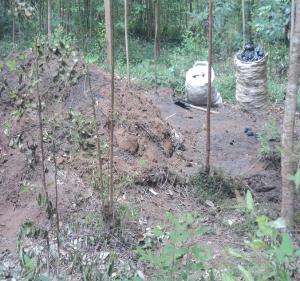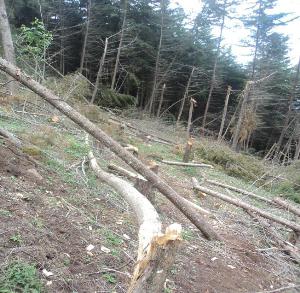Rogers Katua Makau
his project is aimed at improving forest conservation through enhanced capacity and conservation awareness among the community neighbouring Mbooni hilltop forests.

Charcoal kiln at Mulooni forest.
Dry-land hilltop forests are among the most threatened ecosystems in Kenya owing to marginalization, poverty and ignorance among the neighbouring communities. These hilltops are species rich ecosystems and provide numerous benefits such as water, medicine and timber. Although a number of the hilltops are protected as forest reserves, conservation efforts are minimal, or non-existent. A case at hand is Mbooni hilltops located in Makueni County which falls under the Kenya’s marginalized arid semi-arid lands (ASALs). These forests are currently in peril due to unsustainable activities particularly illegal logging, charcoal burning and livestock grazing.

Illegal logging in Katende forest.
This project is therefore aimed at enhancing forest conservation through establishment and strengthening of Community Forest Associations (CFAs) neighbouring the five main hilltop forests ((Mulooni, Katende, Utunene, Kivale and Mavindu). CFAs are institutions that are legally recognized by the KENYA FOREST ACT 2005 for participatory management of forests resources. This offers opportunities for improved forest management whilst providing incentives to communities through sustainable livelihood activities. As such, the CFAs will be trained and their capacity enhanced for sustainable utilization of forest resources. Community tree nurseries will be established to propagate indigenous trees targeted by loggers and other commercially valuable indigenous and exotic tree species. A community indigenous seed bank will also be initiated to supply seeds to the CFAs. The well managed tree nurseries will provide a sustainable source of seedlings for reforestation to rehabilitate the degraded forest as well as provide group members with seedlings to expand their tree farming systems.
In addition, tree nurseries will provide financial incentives to the members through trade in seedlings. Other potential nature-based community livelihood activities such as bee keeping and alternative sources of energy including energy saving stoves and briquettes will be popularized among the local community. This will help to reduce pressure on the forest for forest products and services. By contributing to local income through income generating activities the communities will be encouraged to rally to protect the forests as economic assets. Education and awareness will be conducted in the neighbouring schools to encourage them to form Environmental Clubs which will be linked to the CFAs and the Wildlife Clubs of Kenya.
Ultimately, a community re-afforestation and afforestation exercise involving all the stakeholders will be conducted in all the hilltop forests targeting to plant 5000 seedlings. Tree planting will in the long term help to mitigate climate change effects which are more deleterious in ASALs regions.